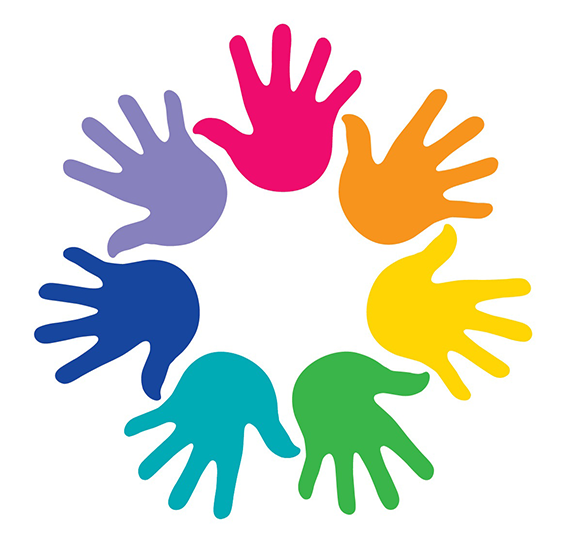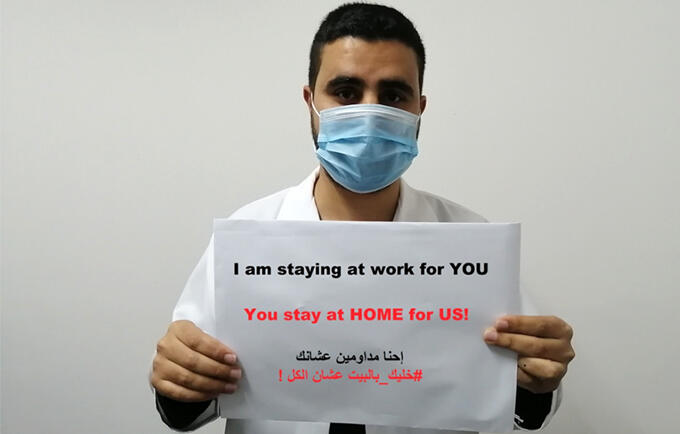The COVID-19 pandemic is straining public health systems and triggering unprecedented measures by governments around the world, including movement restrictions and shelter-in-place orders. On the 20th of March 2020, the Government of Jordan announced the start of a nationwide curfew, until further notice. The curfew prohibits the movement of people and orders the closure of all shops, with a few exceptions. The most important component of an effective response to the COVID-19 pandemic is the rapid use of knowledge and information. Young people can be an important resource in mitigating risks and in community outreach during this crisis. As shown below, Jordanian youth are showing multiple examples of how they are responding and mobilizing themselves during this time.
Peer Education to Combat COVID-19
Dr. Salameh Habashneh, a 23-year-old male, is the Focal Point in charge of the Youth Peer Education Network (Y-PEER) in Jordan. The network is supported by UNFPA and utilizes a peer education approach in raising awareness about sexual and reproductive health issues. In the midst of the crisis, the Y-PEER members started to mobilize social media platforms to spread awareness messages on how to combat the COVID-19 virus in Jordan. Dr. Salameh, who is in his final year at the Medical School at the University of Jordan, joined the volunteering forces at the university hospital in the Emergency Department. In many of the hospitals in Jordan, medical teams are understaffed while trying to assist and care for COVID-19 cases, which makes volunteerism crucial. Dr. Salameh and his peers are dedicating their time to cover the staff shortage and provide support to the hospital, especially with the suspension of university classes and hospital rounds. “Flattening the curve is our responsibility,” says Dr. Salameh and continues stating that: “14 days can decide the destination of Jordan, whether we witness an outbreak or contamination. We, the youth, have the responsibility to stay home as per the Government instructions and to raise awareness among our families and communities on protection and prevention measures. I volunteer at the hospital as a medical doctor and work with Y-PEER to raise awareness, as part of my social responsibility toward my country”.
Shifting Youth Physical Spaces to Virtual Youth Spaces

Liwan Youth Space supported by Action Aid is one of the active spaces in Amman that serves youth living in Jordan. Baraah Bataineh, a 26-years-old female, is one of the co-founders of the space and describes how the outbreak of COVID-19 in Jordan provided her with the opportunity to self-education. “I took two WHO open online courses on COVID-19: a) Operational Planning Guidelines and b) COVID-19 Partners Platform to support country preparedness and response and Emerging respiratory viruses, including COVID-19: methods for detection, prevention, response, and control”, says Baraah. With restrictions on mobility due to the curfew, Baraah along with her peers, volunteers and community representatives of Liwan, started to transform Liwan services online. Currently, Liwan is supporting an online public session three times a week, mainly focusing on the implications of the COVID-19 pandemic. Additionally, they are leading a group of volunteers (activists, content developers, media influencers, etc.) to fight Fake News by an electronic hype through key hashtags twice a week to face rumors and amplify preventive instructions to raise further awareness on the COVID-19. Recognizing the importance of mental health during this time, Liwan is working with specialized counselors who provide virtual sessions for youth. One of their innovative initiatives is supporting youth groups and initiatives by covering expenses for online meeting platforms as an alternative for physical meetings.
Liwan Youth Space
Overcoming Limitations for Youth in Camps

Many vulnerable young people, such as young migrants, young refugees, those in detention, and young people living in crowded areas such as townships or slums, live in conditions that put them at greater risk of contracting COVID-19 where hygiene and sanitation are difficult to maintain. They also have limited access to technology and alternate forms of education and information, including how to mitigate exposure to disease. Refugee camps are also affected by the nationwide curfew, UNFPA/Questscope Youth Center “A Space for Change” is not operating due to the government's decision to close all public places; only allowing public hospitals to operate. Although the youth spaces in Zaatari Camp for Syrian refugees have limited connectivity due to weaker internet connection, 50 youth volunteers at UNFPA/Questscope Youth Center are utilizing their WhatsApp groups to spread awareness messages their families, neighborhoods and other youth and social networks which have been shared by the Youth Task Force in the camp. Mohammad Zaher, a 30-year-old male, who is the manager of the center said: “Things are different now, we have never faced such circumstances. We have shifted all of our awareness work to WhatsApp. Youth are very enthusiastic to conduct initiatives in the street, but the main message is 'Stay at Home' to protect yourself, your family and your community”. Zaher further shared that the internet connection varies from one area to another in the camp, but many university students bought internet routers to ensure reliable access to the internet to continue their virtual education. Anwar, a 29-years-old female, is one of the youth workers in the center who recognizes the importance of staying at home and raising awareness among her peers and community inside the camp. Her children are attending their classes through TV channels dedicated by the government in collaboration with the Ministry of Education, but she feels that in the next phase, we need to think of innovative approaches to engage young children and adolescents to keep them motivated and enhance their learning opportunities.
Youth Collective Action is the Key!

Young people represent a valuable resource and network during crises and public health emergencies. With the right training on the COVID-19 and its transmission, young people can work jointly with health authorities to help break the chain of infection. The Jordan Youth Peace and Security 2250 National Coalition is working toward a collective action by mobilizing 22 organizations and entities from research institutes, universities, civil society, UN actors, and INGO’s, in addition to 20 young females and males working in multiple ways for peace and security across the Kingdom. The Coalition will be working with the national campaign “Elak o Feed” which translates “For you and for the benefit of others” in collaboration with the Ministry of Health, Royal Health Awareness Society, UNICEF, WHO and National Center for Family Affairs. The campaign focuses on virtual and social media messaging around COVID-19. In spite of digital inequalities, this generation of young people is more connected to technology, media, and the internet than any other generation. In this time of social distancing and lockdowns, many young peoples' familiarity with technology is fundamental in spreading vital information, supporting each other and the larger community. Jordanian youth are playing a critical role in disseminating accurate information on COVID-19 on risk reduction, national preparedness and response efforts.


